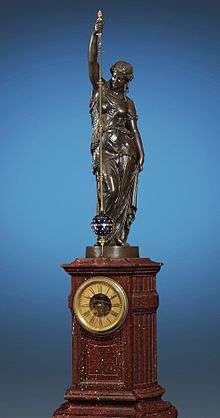Urania
Urania (Uranya as a variant form) (/jʊəˈreɪniə/; Ancient Greek: Οὐρανία, Ourania; short name Ράνια, Rania, Ranya; meaning "heavenly" or "of heaven") was, in Greek mythology, the muse of astronomy, and in later times, of Christian poetry.

Family
Urania was the daughter of Zeus by Mnemosyne and also a great granddaughter of Uranus.[1][2] Some accounts list her as the mother of the musician Linus[3] by Apollo[4] or Amphimarus,[5] son of Poseidon, and Hymenaeus also is said to have been a son of Urania.[6]
Function and representation
Urania is often associated with Universal Love and the Holy Spirit. Sometimes identified as the eldest of the divine sisters, Urania inherited Zeus' majesty and power and the beauty and grace of her mother Mnemosyne.
Urania dresses in a cloak embroidered with stars and keeps her eyes and attention focused on the Heavens. She is usually represented with a celestial globe to which she points with a little staff.[7] She is able to foretell the future by the arrangement of the stars.[8]
Urania as Muse
Those who are most concerned with philosophy and the heavens are dearest to her. Those who have been instructed by her she raises aloft to heaven, for it is a fact that imagination and the power of thought lift men's souls to heavenly heights.[9]
Urania, o'er her star-bespangled lyre,
With touch of majesty diffused her soul;
A thousand tones, that in the breast inspire,
Exalted feelings, o er the wires'gan roll—
How at the call of Jove the mist unfurled,
And o'er the swelling vault—the glowing sky,
The new-born stars hung out their lamps on high,
And rolled their mighty orbs to music's sweetest sound.
—From An Ode To Music by James G. Percival
During the Renaissance, Urania began to be considered the Muse for Christian poets. In the invocation to Book 7 of John Milton's epic poem Paradise Lost, the poet invokes Urania to aid his narration of the creation of the cosmos, though he cautions that it is "[t]he meaning, not the name I call" (7.5)
In popular culture

Urania in Astronomy and Navigation
- The planet Uranus, though mostly named after the Greek god personifying the sky, is also partially named after Urania.[10][11]
- Urania is the namesake for astronomical observatories in Berlin, Budapest, Bucharest, Vienna, Zürich, Antwerp and Uraniborg on the island of Hven. The main belt asteroid 30 Urania was also named after her.
- There is Polish astronomical magazine Urania - Postępy Astronomii, which emerged from "Urania" and "Postępy Astronomii" magazines.
- In University of São Paulo, the logo of the Institute of Astronomy, Geophysics and Atmospheric Sciences used to bear Urania.
- The official seal of the U.S. Naval Observatory portrays Urania. Hr.Ms. Urania is a sail training vessel for the Royal Netherlands Naval College. There has been a Hr. Ms. Urania in the Royal Netherlands Navy since 1832.
- Urania was depicted on the box cover of Urania's Mirror, a set of 32 astronomical star chart cards, first published in November 1824.
- Urania Cove in Antarctica is named after the muse.
Other uses of "Urania"
- Urania is the name traditionally given to the eighth book of Herodotus' Histories.
- Urania is often an epithet given to Aphrodite in contrast with her other aspect Aphrodite Pandemos.[12]
- Urania Cottage was a refuge for fallen women established by the writer Charles Dickens in Lime Grove, Shepherd's Bush, London in the late 1840s. The funding was provided by millionaire and philanthropist Angela Burdett-Coutts, of the well-known banking family. Some of the inmates may have provided inspiration for certain of the female characters in Dickens' novels.
- At Columbia University, toward the end of 18th century, the Urania Society was created for the improvement of oratory and literary skills. DeWitt Clinton was a member.
- Urania Street is situated between Polymnia ("Polyhymnia") and Felicity streets in New Orleans.
- Urania is a name of the sports hall in Olsztyn (Poland).
- Muse magazine, until 2015 when the magazine was revamped, featured Urania as one of the characters in the "Kokopelli and Co." comic strip by Larry Gonick published in each issue of the magazine. She was the only original muse who remained among the "New Muses" featured in the magazine. The other Old Muses were said to be living in a retirement home.
- Urania is the name of a popular female-fronted rock band in Honduras.
- Urania is used as the muse in Paradise Lost books 7 and 9.
- Urania is invoked in Shelley's "Adonais."
- 'To Urania' is a poem, and a book of poetry by Joseph Brodsky nytimes
- Urania is the title character in Lady Mary Wroth's 17th-century novel The Countess of Montgomery's Urania.
- Urania is an Italian science fiction magazine published since 10 October 1952.
- The USS Urania is a faster-than-light spacecraft in the audio drama podcast Wolf 359.
- American singer songwriter, Andrew Gold included a song entitled "Oh Urania (Take Me Away)" about the Greek goddess, on his 1978 album, All This and Heaven Too.
- "Urania" was the title of a journal published by Eva Gore-Booth, Esther Roper, and Irene Clyde beginning in 1916, which challenged the ideology of binary gender and pioneered progressive views of gender and sexuality.
Notes
- Hesiod, Theogony 78
- Ovid, Fasti v. 55.
- Suidas s.v. Linos
- Hyginus, Fabulae 161
- Pausanias, Description of Greece 9. 29. 5
- Catullus lxi. 2.
- Hirt, Mythol. Bilderb. p. 210.
- Statius, Thebaid 8. 548 ff
- Diodorus, Bibliotheca historica 4. 7. 1
- https://books.google.ca/books?id=y20F8Yt6UcMC&pg=PA1&lpg=PA1&source=bl&ots=OmI2bpoGIN&sig=ACfU3U2sEBgitNmop9kUVhLCUTNPx92cWw&hl=en&sa=X&ved=2ahUKEwjdh_WsgdbpAhXd6XMBHSqvDDkQ6AEwEXoECAgQAQ
- https://sites.uni.edu/morgans/astro/course/Notes/section4/new21.html
- "APHRODITE TITLES & EPITHETS - Ancient Greek Religion". www.theoi.com. Retrieved 3 May 2017.
References
![]()
External links
| Wikimedia Commons has media related to Urania. |